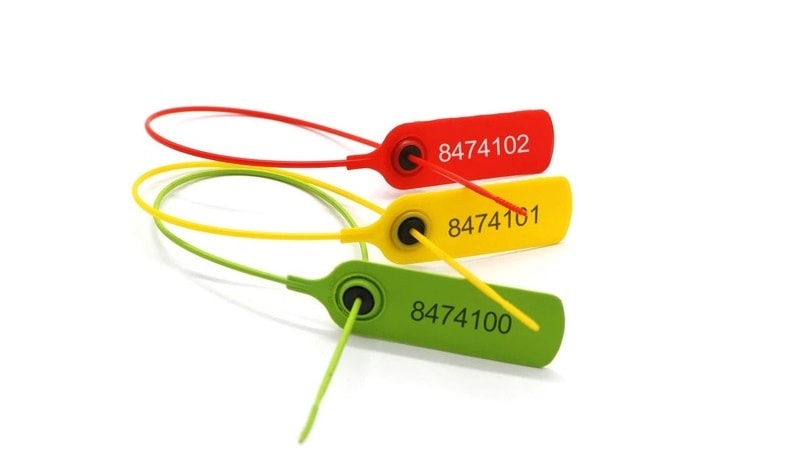Supply chains involve multiple checkpoints. Products change hands several times before reaching their destination. And without proper tracking—errors and security breaches can occur. However, custom serial numbering on the security seals helps prevent this.
With their unique numberings, businesses can verify each shipment’s authenticity. They can also trace any security breach back to its source. In this article, we will explore how serial numbers improve traceability. We will also discuss how this tamper-evident solution strengthens supply chain security.
What Is Serial Numbering on Security Seals?
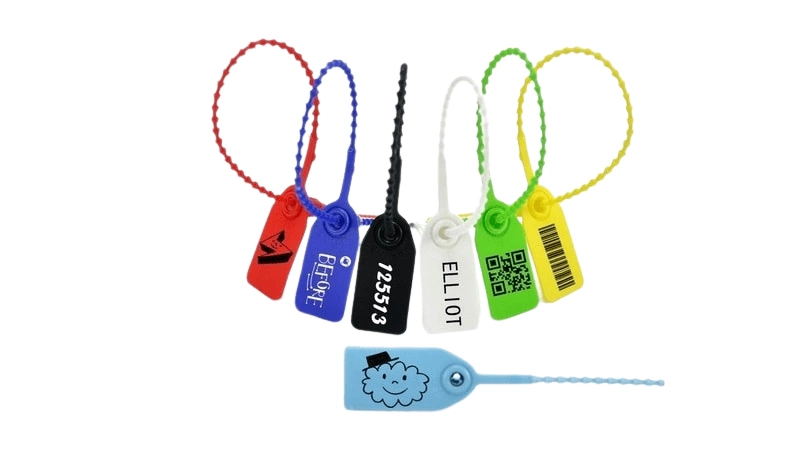
Serial numbering on a security seal is a security feature that assigns a unique number to the seal. This number is printed, engraved, or laser-marked on the security seal—making each seal distinct. This feature helps in tracking, authentication, and preventing tampering.
Unlike generic numbering, companies can include barcodes, QR codes, or alphanumeric sequences for better identification.
Here is how custom serial numbers work for identification and tracking:
- Unique Identification: Each seal is given a one-of-a-kind number that can’t be duplicated.
- Recording & Tracking: The number is logged in records after the seal is applied.
- Verification: Upon inspection, officials check if the seal’s number matches the recorded data.
- Tamper Detection: If a seal is missing or replaced with a different number, it signals possible tampering.
Why Traceability is Crucial in Supply Chains?
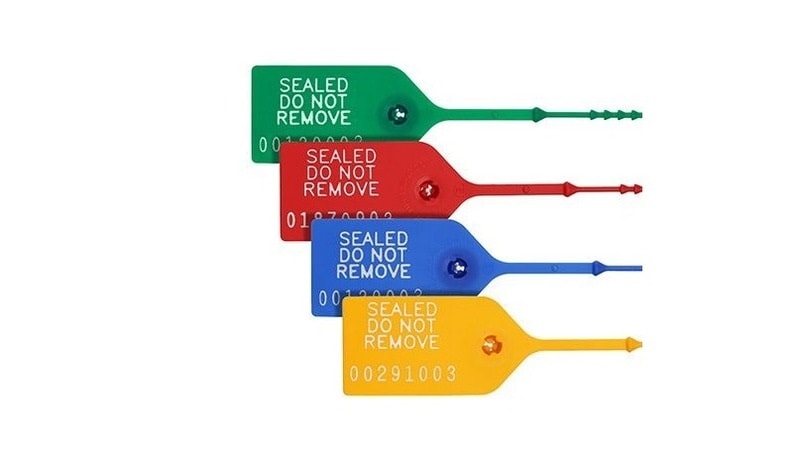
Tracking shipments helps prevent fraud and ensures product integrity. Without a clear system, businesses face risks like theft, counterfeiting, and tampering. Serial numbering on security seals allows companies to track products at every stage. This improves supply chain security and helps identify problems before they escalate.
Industries like pharmaceuticals, food, and logistics depend on strong traceability systems. In pharma, tracking batch numbers prevents counterfeit drugs from entering the market.
The food industry uses traceability to detect contamination and defective products. Logistics companies rely on tracking to manage distribution and reduce losses.
Besides, regulatory compliance is another key reason for robust traceability. Many regions have strict rules for tracking goods. And businesses must follow guidelines for security seal numbering, product tracking, and quality control. Meeting these standards reduces legal risks and improves operational efficiency.
How Custom Serial Numbering on Security Seals Enhances Security?
For Manufacturers: Prevents Unauthorized Access and Counterfeiting
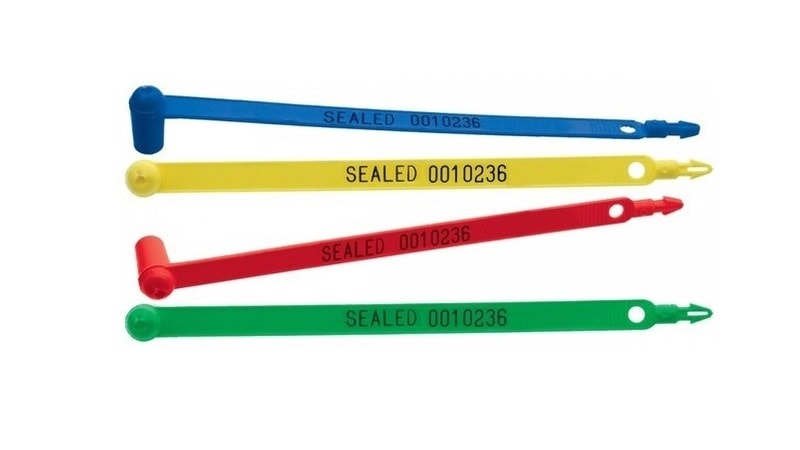
Unique serial numbers are a powerful tool to prevent counterfeiting. When each seal has a different number—copying becomes very difficult. And if someone tries to replace a seal with a fake one, the mismatching number will reveal the tampering.
For manufacturers, the custom serial numbering on security seals:
- Reduces the likelihood of counterfeit items entering the supply chain.
- Acts as a strong deterrent against unauthorized tampering.
The use of distinct numbers on security seals also helps to strengthen the overall security of the goods being transported. Manufacturers can use these numbers to track each individual product. This is crucial for maintaining the trust of consumers and protecting the reputation of the company.
For Logistics: Enables Real-Time Shipment Tracking and Authentication
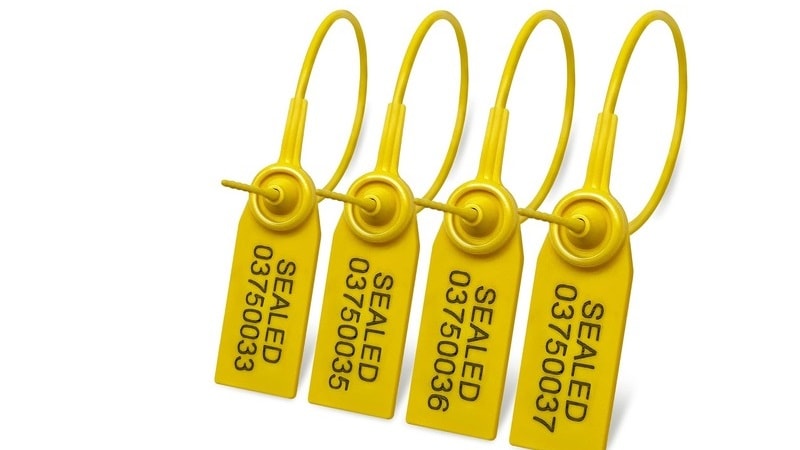
Serial numbers allow companies to track shipments in real-time. Digital logging systems record the movement of each seal. By integrating barcodes or QR codes, instant authentication becomes possible. This ensures that only authorized personnel can verify and break the seals.
For logistics, the custom serial numbering on security seals:
- Offers immediate visibility into the location and status of shipments.
- Allows for rapid authentication using scanning technology.
- Limits verification access to designated personnel.
This real-time tracking gives businesses greater control over their supply chain. The systems provide valuable data that allows them to identify any potential issues quickly. This enhances traceability and improves the overall efficiency of the distribution process.
For High-Value Goods: Strengthens Supply Chain Security
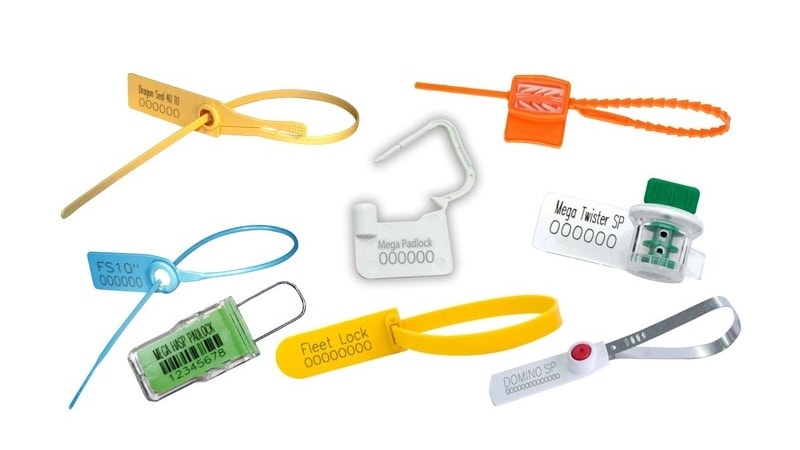
Serial numbers help to pinpoint the exact location and time of any breach within the supply chain. This protects valuable goods from being tampered with or replaced.
The presence of unique numbers acts as a visible deterrent—discouraging unauthorized interference. And it is essential for maintaining security during the distribution of goods.
For high-value goods, the custom serial numbering on security seals:
- Allows for precise tracking of breaches within the supply chain.
- Protects high-value items from unauthorized tampering or substitution.
- Serves as a clear visual deterrent to potential tampering.
By using these numbers, manufacturers can improve control over their production processes. They can track the movement of goods and identify any points of vulnerability. It improves the ability to maintain a secure and reliable supply chain.
For Quality Assurance: Improves Traceability and Accountability
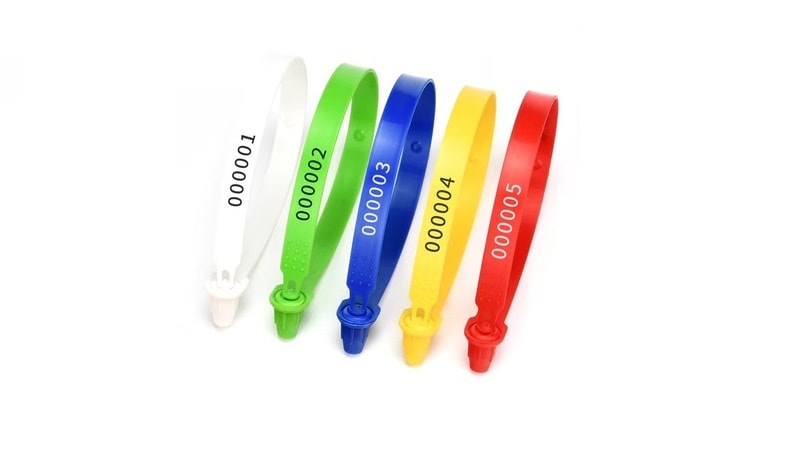
Serial numbers make it possible to trace defective or tampered products back to their original source. This reduces the risk of contamination, particularly in sensitive industries like food and pharmaceuticals. This is vital for maintaining high-quality standards.
For quality assurance, the custom serial numbering on security seals:
- Enhances internal audits and promotes accountability among handlers.
- Reduces the potential for contamination in sensitive industries.
- Facilitates tracing of defective or tampered goods to their origin.
These numbers enhance traceability throughout the manufacturing process. They help to identify the source of any defective products, allowing for rapid product recall. This improves overall production and ensures that consumers receive safe and reliable goods.
For Retail & E-Commerce: Prevents Fraud
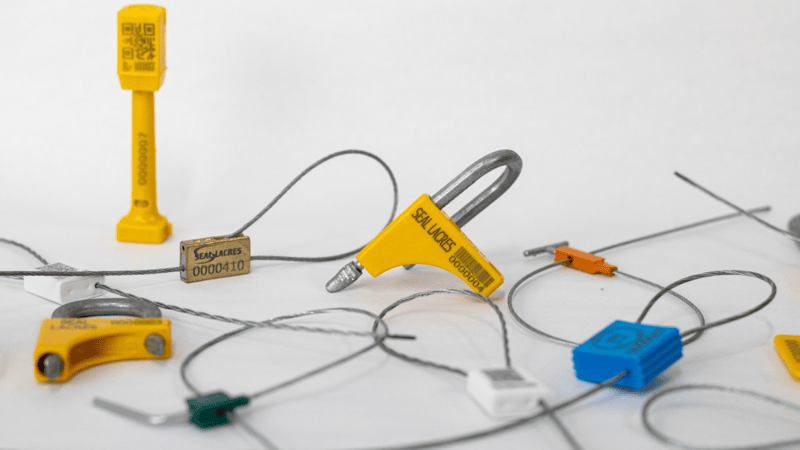
Stores and online shops use security seals to protect valuable e-commerce shipments. These include things like electronics, luxury items, and medicines. Serial numbers add extra security. They stop people from opening packages without permission. They also prevent false claims.
For retail and online stores, the custom serial numbers on security seals do several things:
- They keep goods safe from the warehouse to the customer.
- They help check returns by matching numbers to the original shipment.
- They guard against theft and package tampering during delivery.
When businesses use security seals with serial numbers, they build customer trust. Customers feel more confident knowing their orders are secure. Seals show that packages have not been opened or altered. Reliable deliveries create a better shopping experience.
For Compliance Teams: Enhances Regulatory Adherence
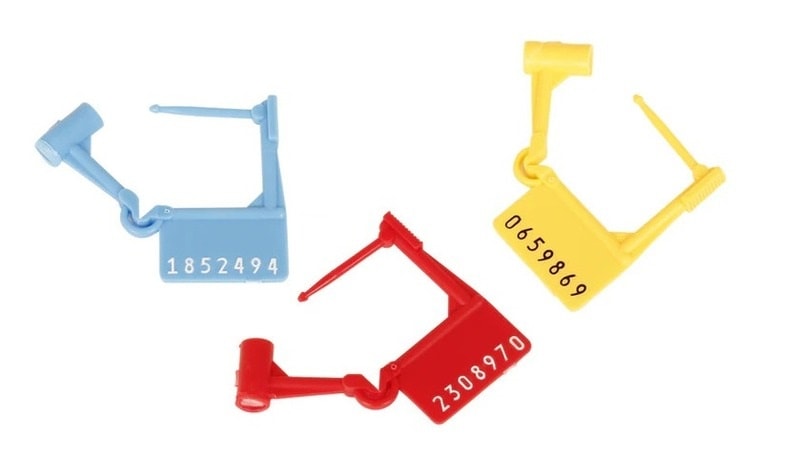
Serial numbers play a key role in meeting industry regulations. Many sectors, such as pharmaceuticals, food safety, and customs, require strict traceability measures. Unique numbering ensures that businesses follow ISO standards and other security protocols.
For compliance teams, the custom serial numbering on security seals:
- Supports adherence to ISO standards and government security protocols.
- Helps companies avoid penalties for non-compliance.
- Facilitates the creation of accurate documentation for audits and legal needs.
Keeping detailed records of serial numbers simplifies regulatory checks. Auditors can quickly verify that the right security measures are in place. This reduces compliance risks and ensures smooth operations across different industries. This is essential for businesses that want to operate responsibly and legally.
Types of Security Seals with Custom Numbering
Plastic Security Seals
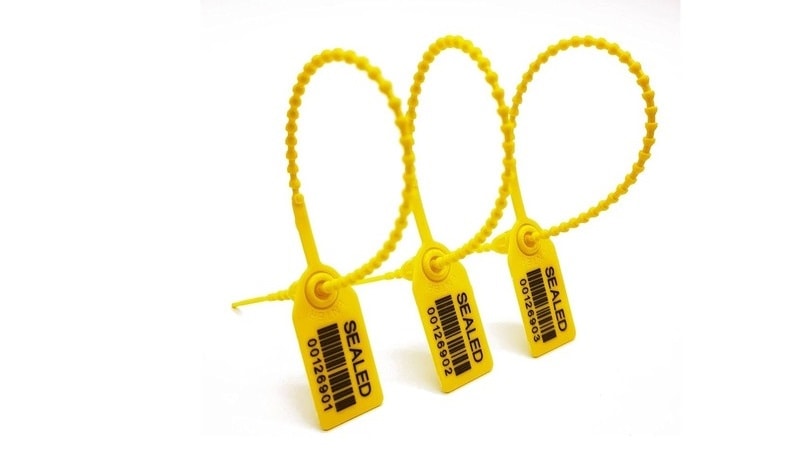
Plastic security seals are lightweight, cost-effective, and easy to use, a security seal type. They are commonly used in logistics, healthcare, and retail to prevent unauthorized access. These seals come with unique serial numbers, allowing for easy tracking and verification.
They break when tampered with, providing clear evidence of interference. Examples of plastic seals are numbered cable ties and pull-tight seals. Plastic seals are good for short term security needs. They’re versatile so they can be used to secure various assets.
Metal Security Seals
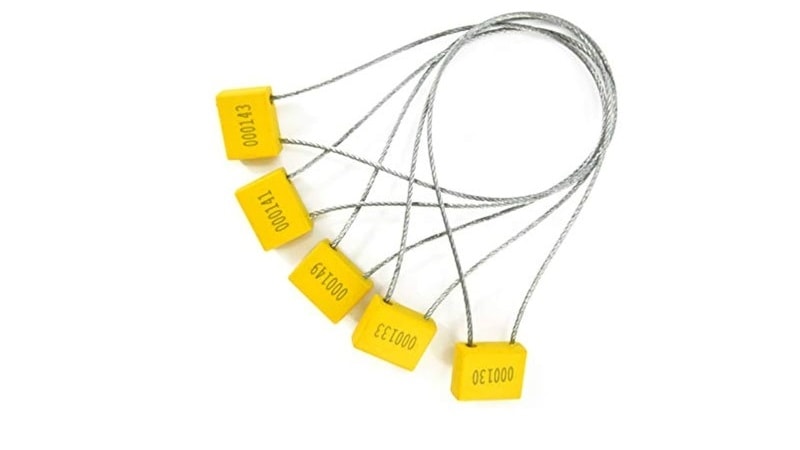
Metal security seals offer more durability and protection against tampering. They’re used in transportation, shipping and high security applications. Each seal has a custom serial number so you can track and detect unauthorized access.
These seals require tools for removal, preventing accidental breakage. Examples of metal security seals include bolt seals, cable seals, and indicative seals. The tamper technologies used in them ensure strong protection against theft.
Electronic Seals
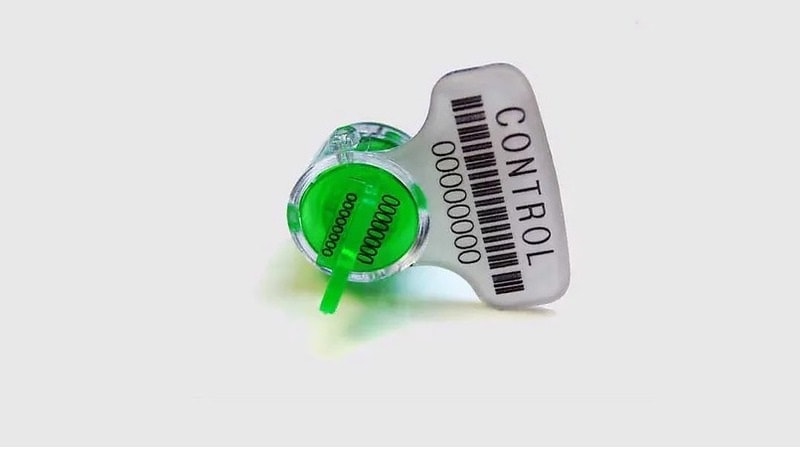
Electronic security seals provide advanced tracking and authentication. They integrate digital technology, such as barcodes, QR codes, and RFID chips for real-time monitoring. These seals improve traceability and security in industries handling sensitive or high-value goods.
Examples of electronic seals include barcode seals, QR code seals, RFID seals, and GPS-enabled seals. These seals help businesses enhance security while ensuring compliance with strict industry regulations. They are particularly useful in the pharmaceutical, food safety, and logistics industries.
Implementing Security Seal Numbering in the Manufacturing Process
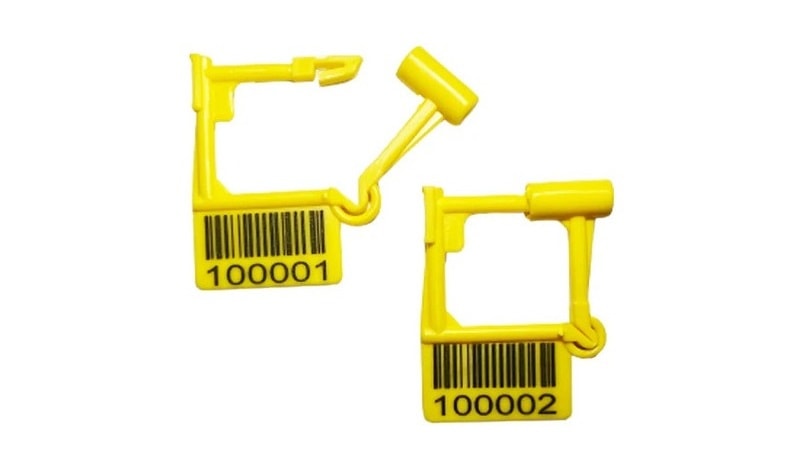
Security seal numbering can work with existing systems. Many businesses integrate serial numbering with barcode or RFID technology. This speeds up tracking and reduces human error. Scanners can quickly verify seals, ensuring smooth operations.
To maximize effectiveness, companies should:
- Use tamper-proof printing methods: Engraving, embossing, or laser marking prevents number alterations.
- Set up a centralized database: All numbers should be logged for easy tracking and verification.
- Train employees on proper handling: Staff must know how to record, apply, and inspect numbered seals.
- Conduct regular security checks: Routine audits help identify and address potential issues.
- Integrate with supply chain systems: Linking seal data with inventory and logistics software improves monitoring.
A well-implemented numbering system adds another layer of protection. It enhances security, improves efficiency, and ensures compliance with industry regulations.
Best Practices for Security Seal Numbering
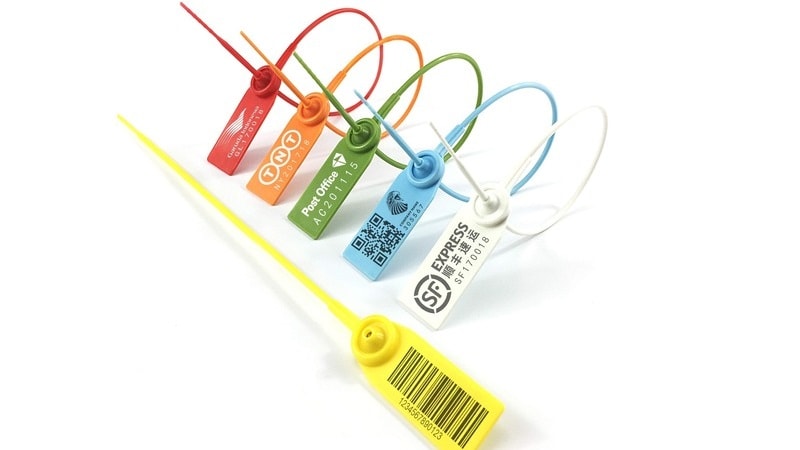
Use unique and authentic numbers for each product or batch. No two numbers should be alike. Each number should be distinct and impossible to duplicate. This prevents counterfeiting and makes it easier to track products throughout the supply chain. Businesses should store these numbers in a secure database.
A secure database is essential for effective serial number management. So, businesses should regularly update and audit their databases to ensure accuracy. Automated tracking systems can streamline verification and reduce human errors. Clear guidelines on how to handle and document security seal numbers should be in place.
Protecting serial numbers from tampering is just as important. Manufacturers should ensure that numbers are printed or engraved using durable materials and methods. Anti-tampering technologies, such as holograms or special inks, can add extra protection. If a number is altered, the system should detect the issue immediately.
Custom colors and batch numbers can further enhance security and authenticity. These features make it easier to identify seals. They also make it harder to create fakes. This improves the overall security of the supply chain. It also helps track goods more efficiently. This reduces the risk of product defect.
FAQs
Can I customize the numbering format on security seals?
Yes, you can. Businesses can choose custom formats, including sequential, alphanumeric, or barcode-based numbers.
What industries use custom serial numbering on security seals?
Many industries use them. This includes pharma and food. Besides, logistics and retail use them too.
Are there digital solutions for tracking serial-numbered security seals?
Yes, digital solutions exist. Barcodes and QR codes help track seals.
Conclusion
Security seal numbering is a critical element in maintaining product integrity. Unique numbers improve security. They act as tamper evident solutions. They also build customer trust, leading to a stronger brand reputation. Overall, investing in custom-numbered security seals creates a secure and efficient supply chain that ensures smooth operations.
Shosky Security’s Security Seal Numbering – Your Best Defense Against Fraud!
Shosky Security provides high-quality, custom-numbered security seals for maximum protection and traceability. With advanced security features and reliable performance, our tamper-proof seals safeguard your supply chain. So, ready to protect your products? Contact us today!
